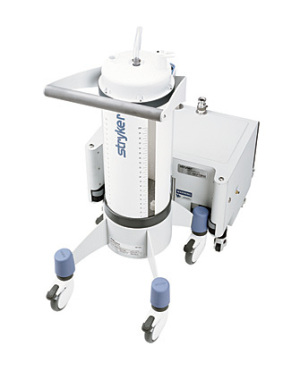by
Loren Bonner, DOTmed News Online Editor | April 25, 2013

Stryker's Neptune
liquid waste management system.
When the U.S. Food and Drug Administration recalled two models of the Stryker liquid waste management systems last year after two patient deaths and other patient injuries due to providers applying high-flow, high-suction vacuums to passive chest drains using the system, hospitals were faced with the daunting task of looking for alternatives to deal with the unpleasant issue of liquid medical waste.
Liquid medical waste, or Red Bag Waste, is a byproduct of many surgeries and procedures. Most hospitals use an advanced system to handle the sometimes toxic liquid — mainly one of the four Stryker liquid waste management models.
The FDA advised hospitals against using Stryker's Neptune 1 Silver and Neptune 2 Ultra liquid waste management systems in October 2012; it also claimed these models were never cleared for marketing. The FDA recommended that health care providers begin using alternative legally marketed devices in their place. Further, hospitals were required to submit a certificate of medical necessity in October and adhere to a list of recommendations if they were not able to discontinue use. Besides submitting the CMN form, these recommendations included implementing a Neptune pre-use checklist, identifying a training facilitator and beginning the transition process for the Silver models. But many experts are advising hospitals to start looking into alternative systems now.
"Regardless of whether you can comply [with the recommendations], it may be that you have to face replacing them," said Chris Lavanchy, engineering director of health devices at ECRI Institute, during an April 17 webinar.
According to Lavanchy, the Silver model has to be replaced by March 2014 because Stryker will not seek 510(k) for that model. Although Stryker will apply for 510(k) for the Ultra model, Lavanchy said there is no guarantee it will be cleared, and this might be problematic because the Ultra is the most common Stryker model used in hospitals, according to ECRI research.
Stryker will no longer be producing the Gold model either, and the Bronze model will only be available in limited numbers.
Based on expert research and opinion, the closed systems are safest for liquid waste management, and point-of-use wall-based systems may offer comparable safety. Lavanchy said that the company Dornoch makes closed systems, although they are priced slightly higher than the Stryker equivalents, and BioDrain and MD Technologies make direct to drain wall-based systems.
Clearly, replacing the Stryker systems is a big issue for hospitals and a costly one too: individual waste management units range in price from $20,000 to $30,000 each, and many hospitals have as many as one per operating room, according to ECRI Institute.
Over 400 people joined the webinar. An ECRI Institute spokesperson told DOTmed News that it was the largest attendance to date for an ECRI Institute webinar.
ECRI Institute's webinar, "Stryker Neptune Waste Management System Recall -- What Now?" is available for viewing in full (for a fee) here.
